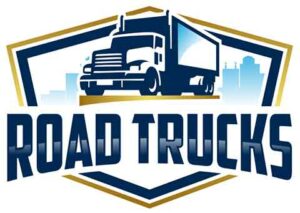You are moving across the country, but just how are you going to get all your items to your new home? A 26-foot box truck pops up on your internet search as the solution, but what do you need to know in order to rent or drive one? Just how much does a 26-foot box truck weigh?
A 26-foot box truck weighs 16,000 pounds without any cargo. When to capacity, the truck may weigh up to 26,000 pounds or 13 tons. This truck is considered the best size for moving, as the driver does not need a CDL license, otherwise known as a trucker’s license, to use it.
We have included the information you need to know about 26-foot trucks below. So, if you want to learn more about how box trucks are used, where to rent one, trucker’s terminology to help you get started, and the possibility of investing in a box truck, continue reading below!
Contents
What Does a 26-Foot Box Truck Weigh?
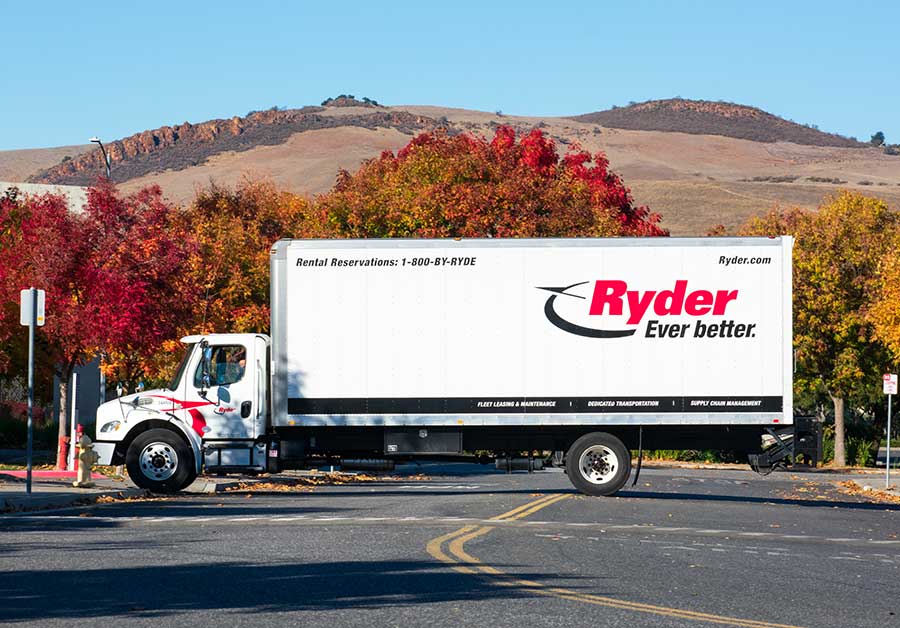
As stated before, the simple answer is that a box truck weighs 16,000 pounds. That is one heavy vehicle! However, this box truck can carry up to 10,000 pounds, making it a perfect vehicle for moving heavy furniture. It has about 1,800 square feet of space inside. But why does this matter to know?
It’s because when you are driving a box truck for the first time, it is important to understand the power and dimensions of your vehicle to bypass fines, damages to the vehicle, or avoidable car accidents. Below we have a chart describing the average dimensions and facts of a 26-foot box truck that we hope you find helpful!
Remember, these numbers may fluctuate slightly depending on the make and model of your truck. Even if a box truck is the same length of 26 feet, it will be made slightly differently, causing a varied weight of around 16,000 pounds.
| Features | 26 Foot Box Truck |
|---|---|
| Length | 26 feet |
| Width | 102 inches |
| Height | 102 inches |
| Base Curb Weight | 16,000 pounds |
| Passenger Seating | 3 person seating |
| Gross Vehicle Weight Rating (GVWR) | 26,000 pounds |
| Cargo Capacity | 1,800 square feet |
Related Article: Do I Need A CDL For Under 26000 LBS
What Terminology Should I Know About Box Trucks?
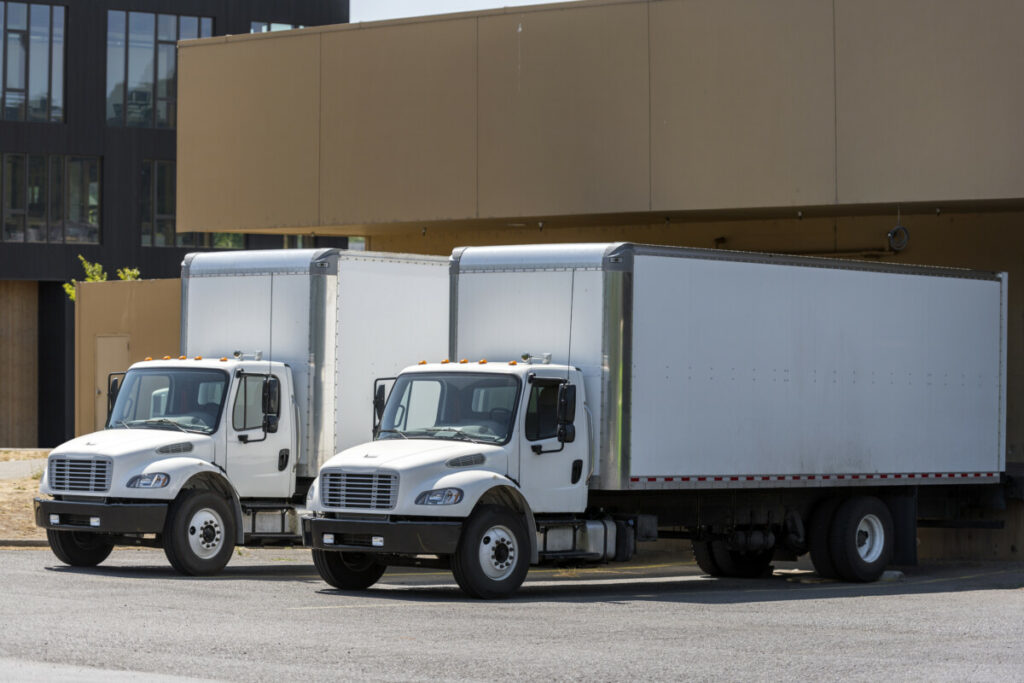
While doing your research, you may come across some words that are unfamiliar to you. We got your back! Here is a collection of trucking terms you may come across when renting or even driving a 26-foot box truck yourself.
Base Curb Weight
This is a very important term when it comes to determining the safety of your vehicle. A “base curb weight,” also known as “curb weight,” is the normal weight of a vehicle with standard equipment.
Cargo Weight
The “cargo weight” is the total weight of all the items you are transporting in your box truck. This will include passengers and optional equipment. It is the weight of anything other than the truck itself.
Gross Vehicle Weight
The “Gross Vehicle Weight,” otherwise known as GVW, is the true weight between the curb weight and the cargo weight. More simply put, the GVW is how much your fully-loaded vehicle weighs.
Gross Vehicle Weight Rating
This sounds very similar to a Gross Vehicle Weight, but the “Gross Vehicle Weight Rating”, shortened to GVWR, is the maximum allowable weight of a fully-loaded vehicle. Simply put, it’s the limit to how much your truck can weigh.
Remember, the curb and cargo weight should never exceed the GVWR. Simply put, how much your truck weighs plus the items you are carrying should never weigh more than the truck’s GVWR.
Payload
The “payload” is the maximum allowed weight of cargo the vehicle can carry. Similar to the GVWR, the payload is simply how much the cargo can weigh.
When Do I Need to Stop at a Weigh Station?
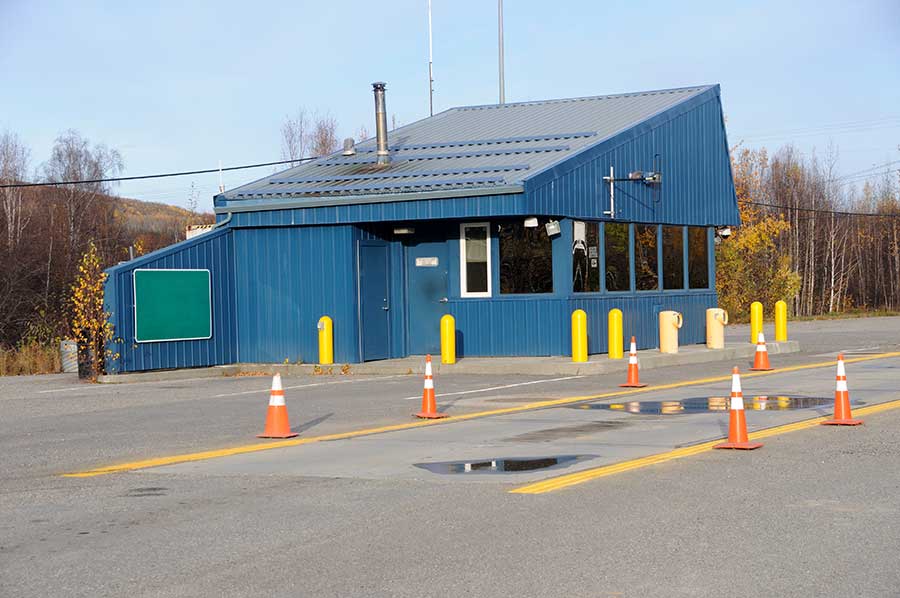
For most states, if a vehicle is less than 10,000 pounds for its Gross Vehicle Weight, it does not need to stop at a weigh station. However, if you are renting a 26-foot box truck, it weighs 16,000 pounds just on its own, without any cargo, so you will need to stop at a weigh station if it is required in your state.
Check out the table below to see the weigh station requirements of your state, and do further research if you are still unsure about your state’s specific laws.
| State | Weigh Station Requirements |
| Alabama | Not required |
| Alaska | Required if Gross Vehicle Weight exceeds 10,000 pounds |
| Arizona | Required if Gross Vehicle Weight exceeds 10,000 pounds |
| Arkansas | Required if Gross Vehicle Weight exceeds 10,000 pounds |
| California | Required for all moving trucks |
| Colorado | Required if Gross Vehicle Weight exceeds 26,000 pounds |
| Connecticut | Not required |
| Delaware | Not required |
| Florida | Only trucks with agricultural products need to stop at an Agriculture Inspection Station. |
| Georgia | Required if Gross Vehicle Weight exceeds 10,000 pounds |
| Hawaii | Required if Gross Vehicle Weight exceeds 10,000 pounds |
| Idaho | Not required |
| Illinois | Not required |
| Indiana | Required if Gross Vehicle Weight exceeds 10,000 pounds |
| Iowa | Required if Gross Vehicle Weight exceeds 10,000 pounds |
| Kansas | Required for all vehicles with a truck registration |
| Kentucky | Not required |
| Louisiana | Not required |
| Maine | Not required |
| Maryland | Not required |
| Massachusetts | Not required |
| Michigan | Not required |
| Minnesota | Required if Gross Vehicle Weight exceeds 10,000 pounds |
| Mississippi | Not required |
| Missouri | Not required |
| Montana | Required if Gross Vehicle Weight exceeds 8,000 pounds or is carrying agricultural products |
| Nebraska | Required if Gross Vehicle Weight exceeds 2,000 pounds |
| Nevada | Not required |
| New Hampshire | Not required |
| New Jersey | Required if Gross Vehicle Weight exceeds 10,001 pounds |
| New Mexico | Required if Gross Vehicle Weight exceeds 26,001 pounds |
| New York | Not required |
| North Carolina | Required if Gross Vehicle Weight exceeds 10,000 pounds |
| North Dakota | Required if Gross Vehicle Weight exceeds 10,000 pounds |
| Ohio | Required if Gross Vehicle Weight exceeds 10,000 pounds |
| Oklahoma | Not required |
| Oregon | Required if Gross Vehicle Weight exceeds 26,000 pounds |
| Pennsylvania | Required for all trucking vehicles |
| Rhode Island | Not required |
| South Carolina | Not required unless the weight seems unlawful |
| South Dakota | Required if Gross Vehicle Weight exceeds 8,000 pounds |
| Tennessee | Not required |
| Texas | Not required |
| Utah | Not required |
| Vermont | Not required |
| Virginia | Required if Gross Vehicle Weight exceeds 7,500 pounds |
| Washington | Not required |
| West Virginia | Not required |
| Wisconsin | Not required |
| Wyoming | Not required |
How Much is it to Rent a Box Truck?
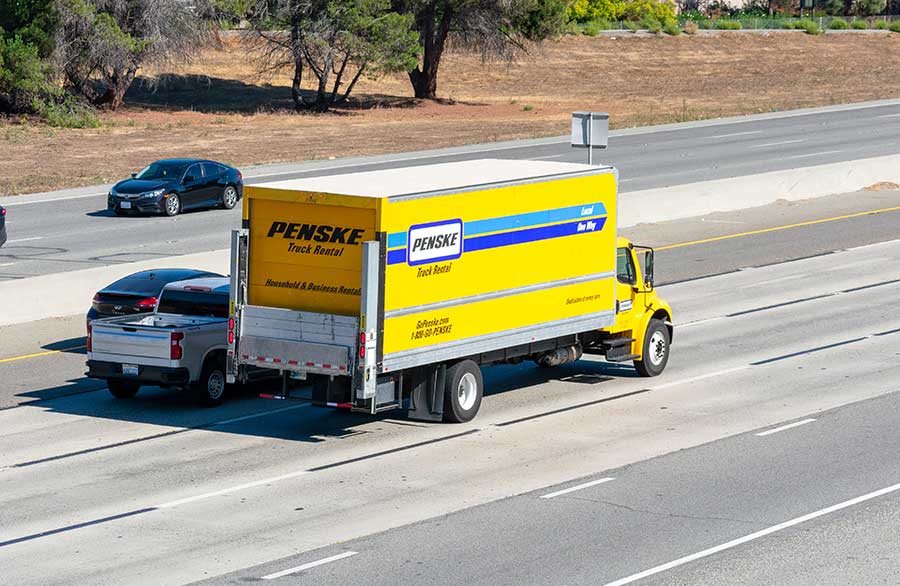
Box truck rental prices vary quite a lot based on their original location, destination, length of rental, and the distance traveled in the vehicle. Below, we have two hypothetical situations between two real trucking companies. Each one-way travel is 388 miles long, but one is nearly double the cost simply because not only because of the company chosen, but the location driven.
In this scenario, Enterprise Trucks is better for distances that could be driven in one day since you need to purchase per day. Trips that must be done in multiple days to get across the country may be better with Penske.
| Rental Company | Price per day | Location | Total price |
| Enterprise Trucks | $97.28 per day plus $0.99 per mile | One way, Alabama to Louisiana | $481.60 |
| Penske | $299.99 plus $1.29 per mile | One way, New York to Maine | $800.77 |
If you are interested, you can also invest in purchasing a box truck and leasing it out to moving or box truck companies. You can make a reasonable profit there, but we will go into depth about this later.
What are Box Trucks Used For?
Box trucks are most commonly used for moving or commercial objectives, including transporting dry goods, such as electronics, retail products, machine or car parts, and other non-perishable goods. They are also often used by people who are moving to a new home. This is one of the reasons why many moving companies will transport your furniture and other belongings for you, as you need a commercial driver’s license (CDL) to drive a 26-foot box truck.
Luckily, most box trucks are not 26 feet long, and there are many box trucks that you can drive without a CDL.
If you are transporting food or perishable foods, the box truck needs to be “food-grade.” What does this even mean? Being a food-grade tailer means that there is no cross-contamination, or the unintentional transfer of microorganisms, chemical contamination, or any foreign substance onto the food inside. This specifically talks about avoiding cross-contamination between raw meat, fresh produce, or products that could cause allergies, such as peanuts. In order to carry commercial food, you need the Food and Drug Administration’s (FDA) stamp of approval.
What Kind of Box Trucks are There?
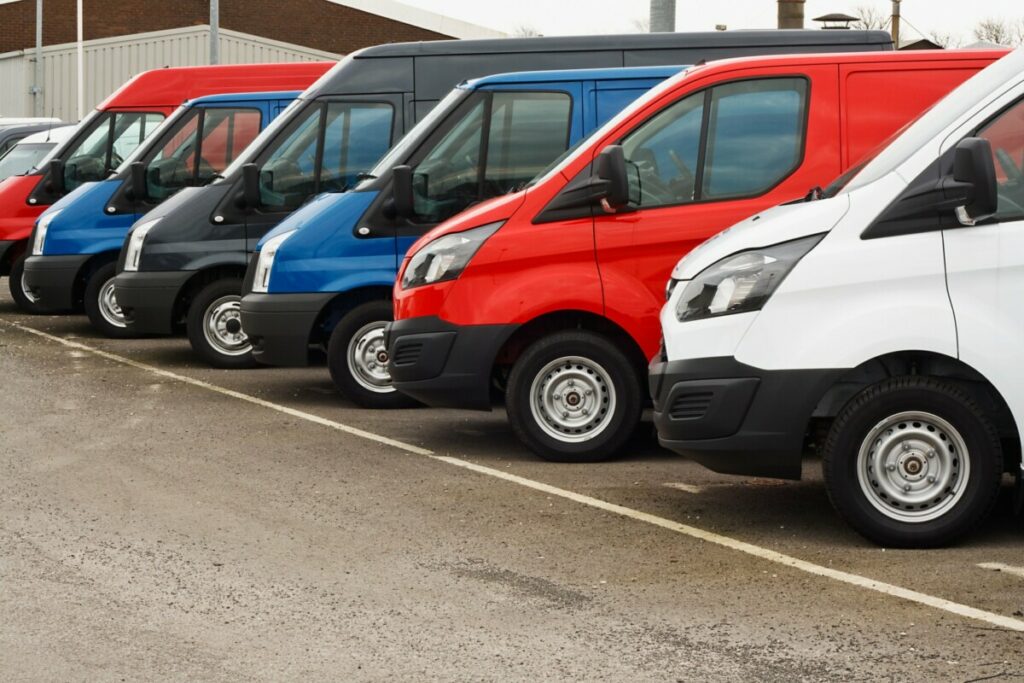
Cargo Vans
Cargo vans are smaller than trucks but are best for moving around smaller and lighter equipment. This can include furniture, wood, landscaping materials, or even four-wheelers and motorcycles. U-Haul vehicles are usually cargo vans. They can be used for smaller moves, such as a high school graduate moving away to college.
Dry Vans
A dry van is a semi-trailer that is fully enclosed to protect the product from weather and long-distance traveling. It is called a dry van because it keeps its cargo, you guessed it, dry! This works for moving commercial products or furniture. Dry vans are not trucks, they are trailers that hook up to moving trucks. Although not a truck, it’s important to differentiate the two since they are used in a similar context.
Medium-Duty Trucks
A medium-duty truck is a truck that has a Gross Vehicle Weight Rating of 19,501 pounds to 33,000 pounds. This is the category that a 26-foot box truck is in. Garbage vehicles and appliance vehicles are also medium-duty trucks. They have a low fuel economy, a tight turning radius, and high visibility. They are mostly used for commercial purposes.
Is a Box Truck a Good Investment?
Because of the high demand for products in the United States, the box trucking business is very profitable if handled correctly. It is easy to set up as well. The equipment that you need is a box van or truck, then you may register your business. However, upkeeping these vehicles is quite pricey. To buy a box truck, the price will range from around $12,000 to $41,000, depending on the age of the vehicle and amount of miles it has been driven.
To make money off of box trucks, you will need to do transporting of some kind. This can be moving appliances, furniture, landscaping materials, building materials, helping families move, becoming a food-grade trailer and transporting food, and so on.
The best manufacturers of box trucks are Isuzu, Ford, Dodge, GMC, Chevrolet, and Nissan. You will be sure to find your perfect vehicle under these brands.
When leasing your box truck, find a reliable box truck leasing company. This way, you can get the funds from renting your vehicle and let professionals do the numbers and leasing. Make sure you have a credit rating of 650 or higher to get the best rate, and thoroughly research the leasing companies you want to utilize. Some leasing companies can do seasonal payment options, so you have a healthy cash flow, all from just owning a box truck.
When leasing a box truck, you may need to purchase a full-service lease. This means that when your truck has an unfortunate breakdown while traveling, it will receive proper care from an expert mechanic. There is little consistency in pay or income for box truck owners because the amount of money they make depends on the number of vehicles they have, the frequency of trips, and by who they are licensed.
In California, a box truck owner will make an average of $96,711 per year. With Amazon, owners could be paid as much as $3,675 per week! It all comes down to the research and who you are licensed with.
If you are looking for a way to sustain an income from an already-owned box truck, this may be a great investment for you. If you do not have one, purchasing one is very pricey and a big commitment. Do your research before making this investment, and make sure you are willing to put in the work to be successful through your box trucks.
